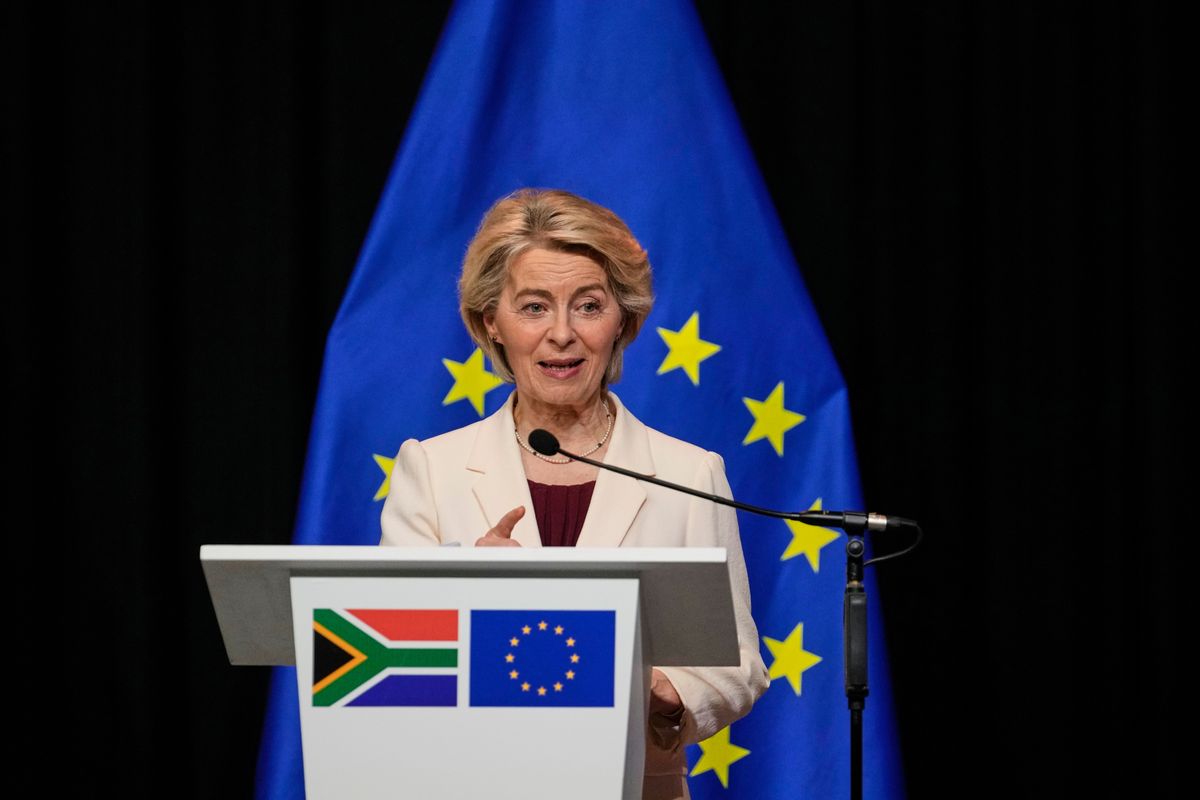BRUSSELS (AP) — Money is as central to Europe’s vital support of Ukraine as ammunition and intelligence. Yet, the bloc’s most viable funding mechanism involves seizing billions of dollars worth of Russian assets that U.S. President Donald Trump has proposed taking over.
The first draft of Trump’s 28-point peace plan called for an investment scheme for Ukraine’s reconstruction controlled by the U.S. but financed by $100 billion in frozen Russian assets matched by another $100 billion from the European Union — with 50% of profits sent back to Washington.
The plan surprised Europeans, who have spent years fiercely debating the fate of Russia’s frozen fortune.
Those funds are central to European Commission President Ursula von der Leyen’s plan to both maintain pressure on Russia and increase support for Ukraine as mysterious drone incursions and sabotage operations rattle European capitals.
“I cannot see any scenario in which the European taxpayers alone will pay the bill,” she said Wednesday in Strasbourg, France to applause from lawmakers in the European Parliament.
The 27-nation EU has sent Ukraine almost $197 billion since Russia invaded Ukraine nearly four years ago. While there’s no consensus on how to provide more aid, there’s near unanimity on seizing the Russian assets to cover the estimated $153 billion for Ukraine’s budget and military needs for 2026 and 2027.
The Commission has proposed paying that bill with joint debt taken on by the EU and grants by individual nations, but its main source is the $225 billion assets frozen at Euroclear, a Brussels-based financial institution.
That is, if the Trump administration doesn’t get them first.
Perks of the deal
Trump’s brash negotiating style left many in Europe suspecting he wants a quick deal that forces Europeans to make it work and pay for it. All while the U.S. profits.
Analysts say the proposal was essentially a U.S. attempt to snatch these assets, coming as Brussels and Washington relaunch trade negotiations over tariffs.
Agathe Demarais, a senior fellow at the Berlin-based European Council on Foreign Relations, said the proposal was akin to a “signing bonus” for a peace deal heavily slanted towards Russia.
Fabian Zuleeg, chief executive of the Brussels-based European Policy Centre, called the U.S. takeover of the assets “outrageous,” but suggested it might also be acceptable to Europeans “if that is ultimately the price to pay for a good deal.”
After intense discussions between the U.S., Germany, France, the United Kingdom and representatives from the European Commission, the investment scheme was removed from the new draft peace plan. Russia has already signaled its total rejection of the new draft.
The assets frozen in Belgium
A quick seizure of Russia’s frozen assets by the EU would not only secure Ukraine’s defense budget, but also empower Brussels at the negotiation table, Demarais said.
“If the EU rushes to seize Russia’s central bank assets before Washington grabs them, the bloc may be able to drastically curb Trump’s interest in a bad deal,” she said.
The European Commission has proposed taking direct ownership of the assets. Under von der Leyen’s leadership, it could then issue a loan to Ukraine, which would be repaid only if Moscow provides war reparations to Kyiv.
The bulk of these assets are held in a clearinghouse called Euroclear in Belgium. However, Belgian Prime Minister Bart De Wever has refused to approve their use as collateral for a massive loan for Ukraine, citing fears that Russia would retaliate against Belgian interests.
“We are a small country, and retaliation could be very hard,” De Wever said in October.
Yet the Belgian position on thawing the assets was influenced by an impasse in local politics over deep federal debt. After months of domestic political wrangling ended last week in a deal, politicians from Riga to Lisbon started hoping that De Wever would be able to lift his objections to seizing Russian assets.
Sweden’s Foreign Minister Maria Malmer Stenergard said after the Brussels meeting on Wednesday that “the clock is ticking” and that seizing the assets was “the only realistic financing option that would make a real difference and one that would be most fair to taxpayers” in Europe.
Kaja Kallas, the EU’s top diplomat said Wednesday there is now broad EU support for Belgium.
“It would send the strongest message to Moscow that it cannot wait us out, and we need to make this decision fast,” said Kallas.
On Dec. 18, De Wever will join the other EU national leaders for a summit in Brussels over, among other subjects, seizing the Russian assets.
____
Associated Press writers Geir Moulson and Kirsten Grieshaber contributed from Berlin.
By SAM McNEIL
Associated Press


